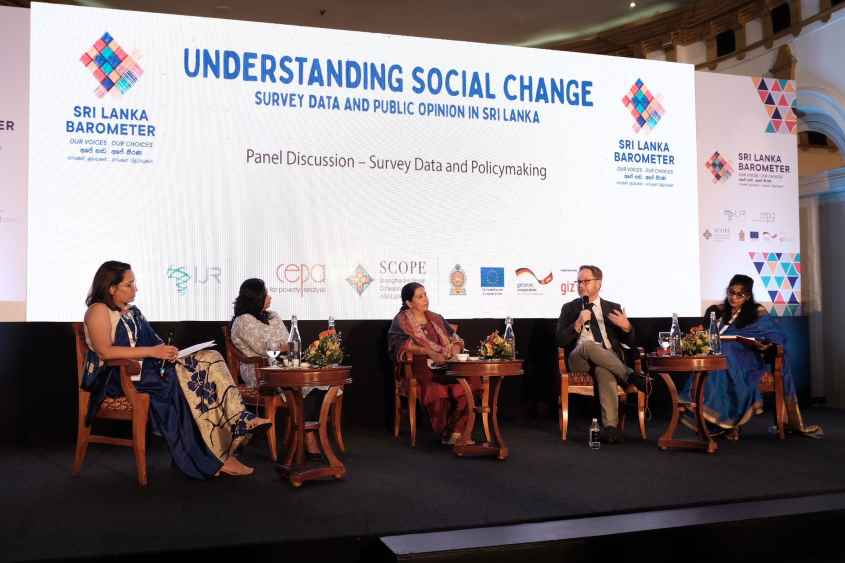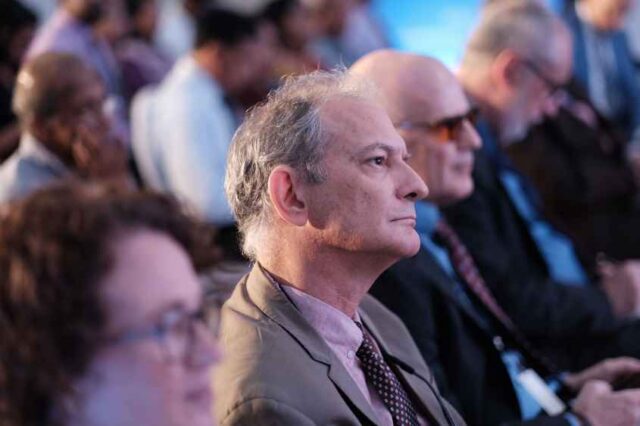
Providing evidence-based information on public opinion among Sri Lankans on Reconciliation and Social Cohesion
Two national reports were launched by the Sri Lanka Barometer (SLB) on 08 May in Colombo, providing public opinion survey data on how Sri Lankans across all provinces view reconciliation and social cohesion. The SLB is supported by the programme Strengthening Social Cohesion and Peace in Sri Lanka (SCOPE), co-financed by the European Union and German Federal Foreign Office and implemented by Deutsche Gesellschaft für Internationale Zusammenarbeit (GIZ) GmbH in partnership with the Ministry of Justice, Prison Affairs and Constitutional Reforms.
At the event themed ‘Understanding Social Change – Survey Data and Public Opinion in Sri Lanka’, the SLB Public Opinion Survey 2021 and the SLB Snapshot Survey 2022 were officially presented to the public in the presence of the Minister of Justice, (Dr.) Wijeyadasa Rajapakshe at the inauguration ceremony at the Taj Samudra.
Attended by a cross section of leading policy makers, researchers, university representatives, media practitioners, clergy and civil society members, the event was hosted by the Sri Lanka Barometer Consortium of partners who implement and steer the SLB, including the Institute for Justice and Reconciliation (IJR) in South Africa, the Centre for Poverty Analysis (CEPA) and SCOPE.

The international dignitaries who graced the occasion included Mario Ronconi, Head of Unit for South and South East Asia, Directorate General for International Partnerships of the European Commission; Olaf Malchow, German Deputy Ambassador to Sri Lanka and the Maldives; and Sandile Edwin Schalk, South African High Commissioner to Sri Lanka and the Maldives.
The Sri Lanka Barometer is a research initiative aimed at deepening the understanding of how Sri Lankans perceive reconciliation and its most salient dimensions. It consists of three main components: a nationally representative public opinion survey, complimentary qualitative research, and outreach events.
It was initiated in Sri Lanka in 2018 on the invitation of the Sri Lankan government and formally launched with the support of the Ministry of Justice. Understanding public opinion on key issues pertaining to unity, harmony and social cohesion has been a key priority for the Government of Sri Lanka. In addition to institutional efforts taken toward public consultations on key reforms, tracking public opinion has also been recommended as important for policymaking, such as in the Diyawanna Declaration of 2019 by the Parliament Select Committee for National and Religious Harmony.
Speaking at the event as its chief guest, Minister of Justice, Prison Affairs and Constitutional Reforms, Hon. (Dr.) Wijeyadasa Rajapakshe, PC, M.P. said: “We are delighted to see that the design of the initiative has been inspired by expertise from South Africa, who we are working with closely and have recently visited to gain the experience of the South African government to formally and successfully take forward truth and reconciliation initiatives.”
In his special address, Mario Ronconi, Head of Unit for South and South East Asia at the Directorate General for International Partnerships of the European Commission, emphasised the need for such an initiative for all stakeholders: “As the European Union, we have supported the Sri Lanka Barometer initiative from the start together with the German Federal Foreign Office. Increasing our understanding of each other is a key element, which provides the potential to drive broader societal progress. Reconciliation and Social Cohesion are key priorities of the European Union’s strategy in Sri Lanka. The Sri Lanka Barometer is a concrete example of how Team Europe can support its partner countries in strengthening their resilience. In the case of Sri Lanka, this support is all the more important since it will not only contribute to improving policymaking, but it will also help safeguard a peaceful society”
The German Deputy Ambassador to Sri Lanka and the Maldives, Olaf Malchow in his official address at the event said: “It gives me great pleasure that Germany is supporting an independent and unique initiative like the Sri Lanka Barometer.”
He further observed that: “In this initiative I see the potential to strengthen the public discourse with reliable data. I also see the potential to bridge gaps within and between communities by diving deeper and understanding the barriers that have to be overcome in order to bring people closer together.”
Going forward, the Sri Lanka Barometer Consortium plans to support the use of quantitative data for key stakeholders in governance, media and civil society through trainings conducted by IJR; a programme to encourage young researchers around the island to engage with the data and conduct qualitative research, headed by CEPA; and public debates to discuss the SLB findings and their implications for Sri Lankans by SCOPE.
Presenting the key highlights from the SLB Survey 2021 and SLB Snapshot Survey 2022 reports, independent researcher Natasha Palansuriya explained that the importance of the initiative is in the methodology which captures a broad definition of reconciliation that is based on Sri Lankans’ understanding and lived experiences. It is strengthened by the sample of nearly 4,000 representing accurately the demographic (age, gender, religion, ethnicity) and geographical (urban, rural, estate, and provincial) diversity of the adult population of the country – enabling everyone to extrapolate nationally representative data with disaggregation of shared opinions across and within communities of Sri Lanka.



